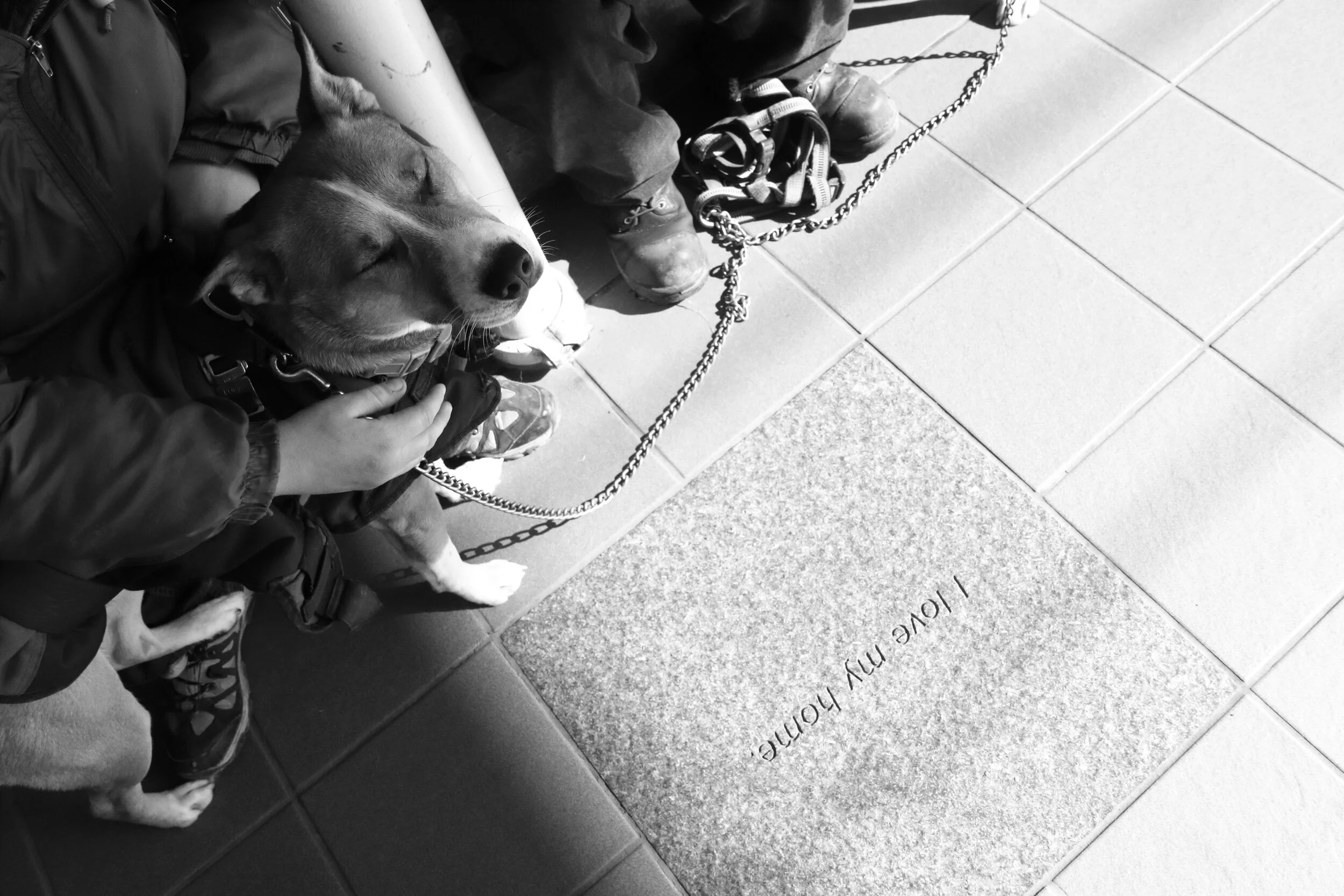“Cuz you don’t know how much homelessness sucks. I mean, life sucks, but homelessness sucks even more because it’s miserable, dank, dark, and dirty. But when you have two puppies, [it’s not] miserable, dank, dark, and dirty – it’s just two kissy faces who want to go out in the rain.”
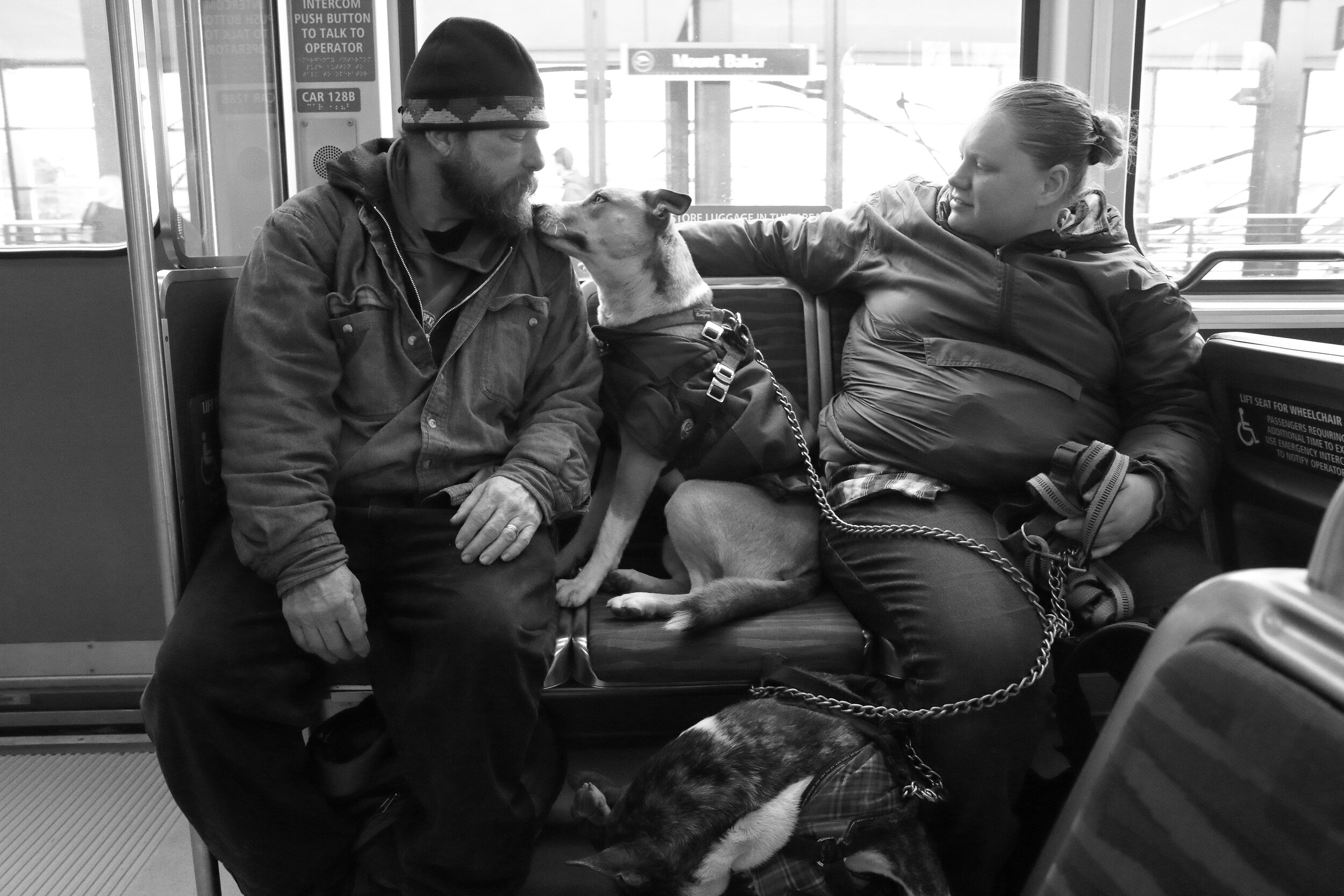
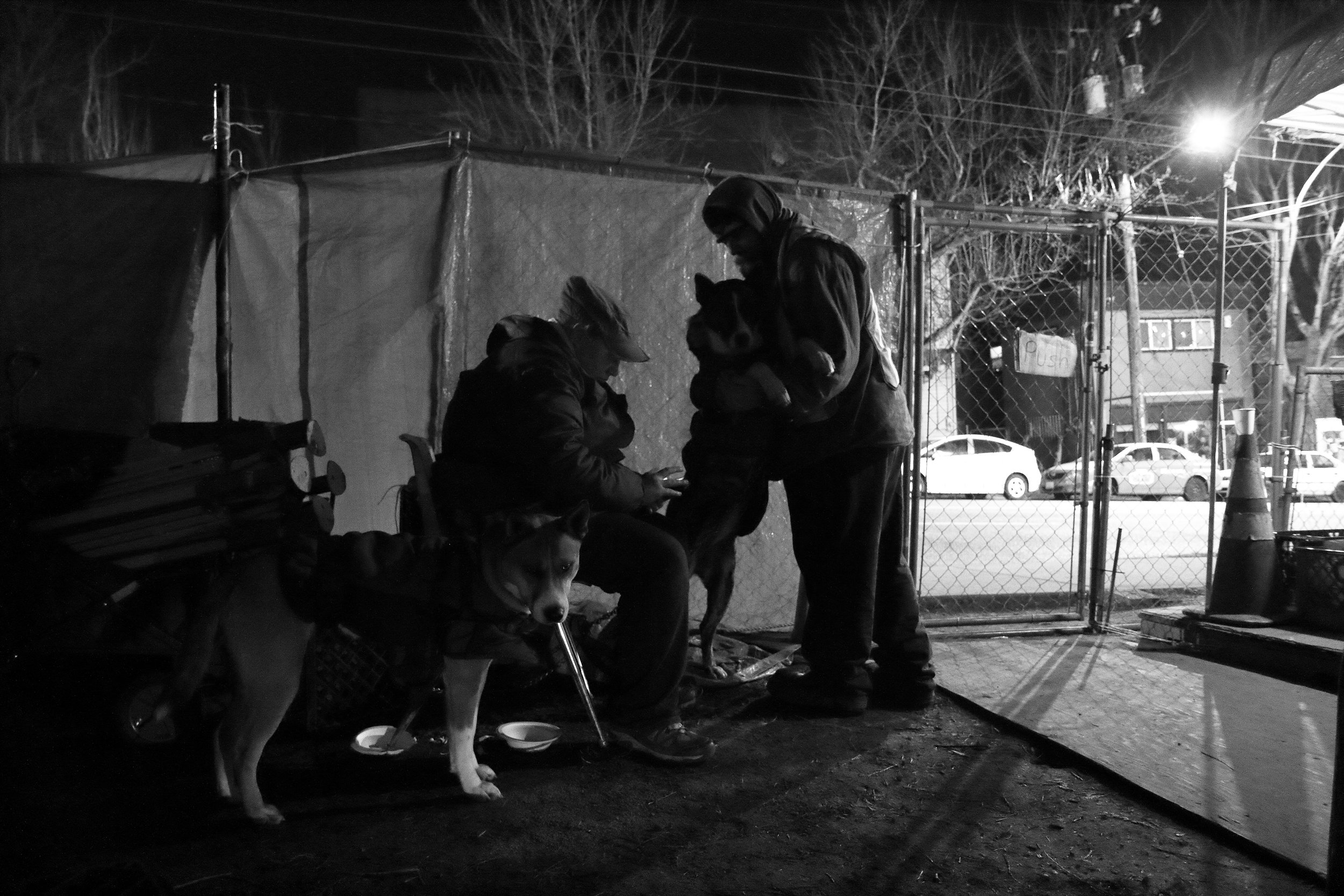
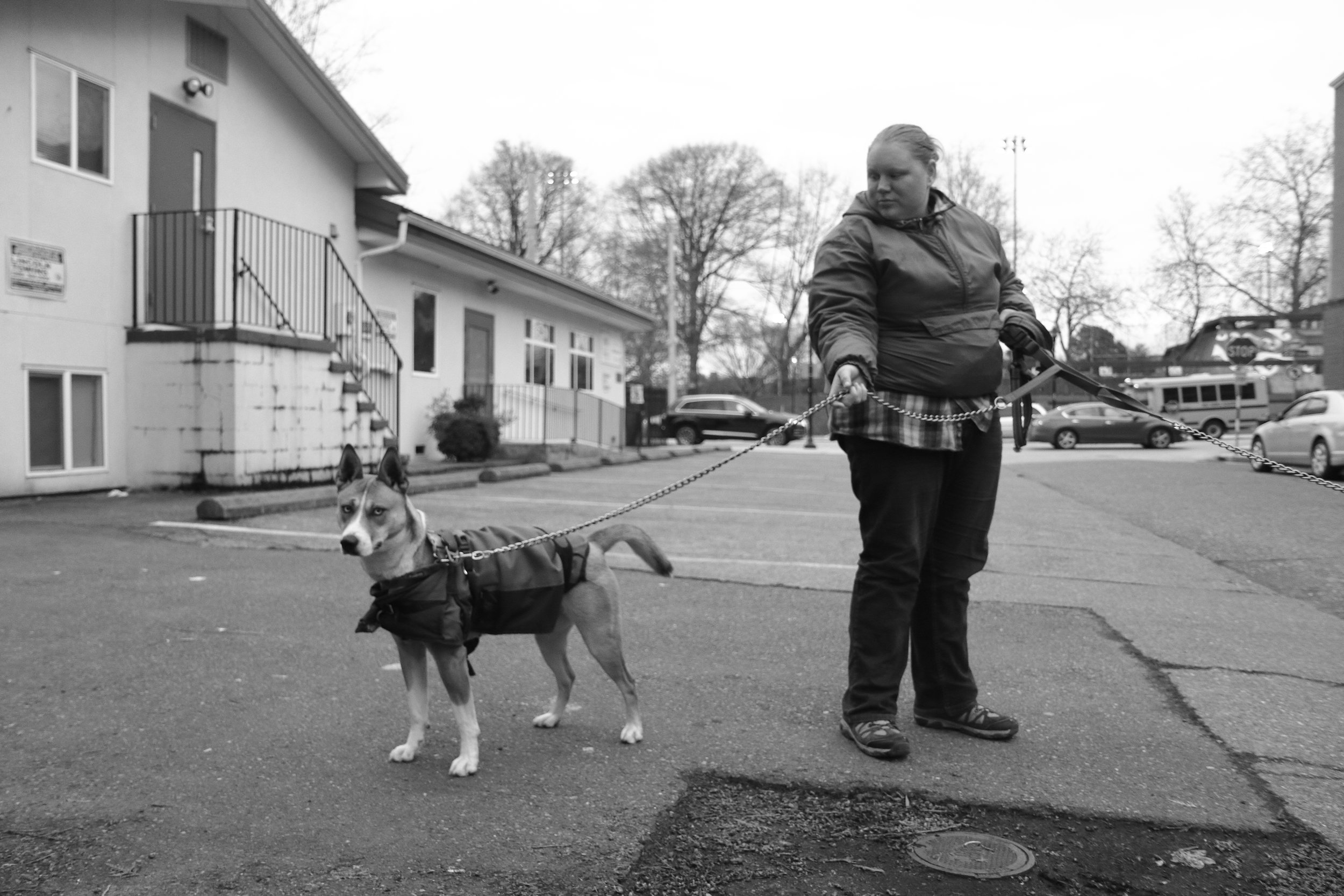
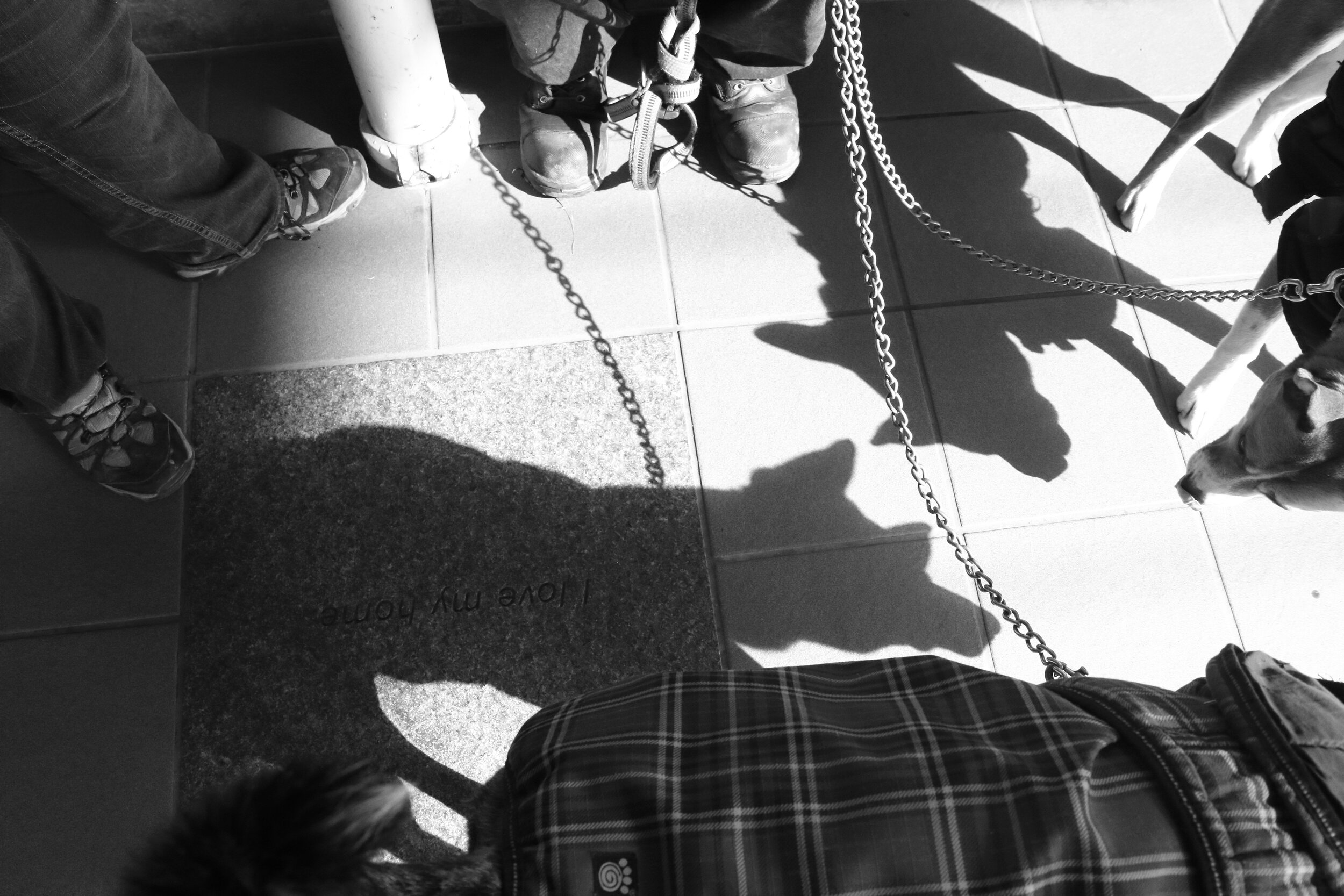
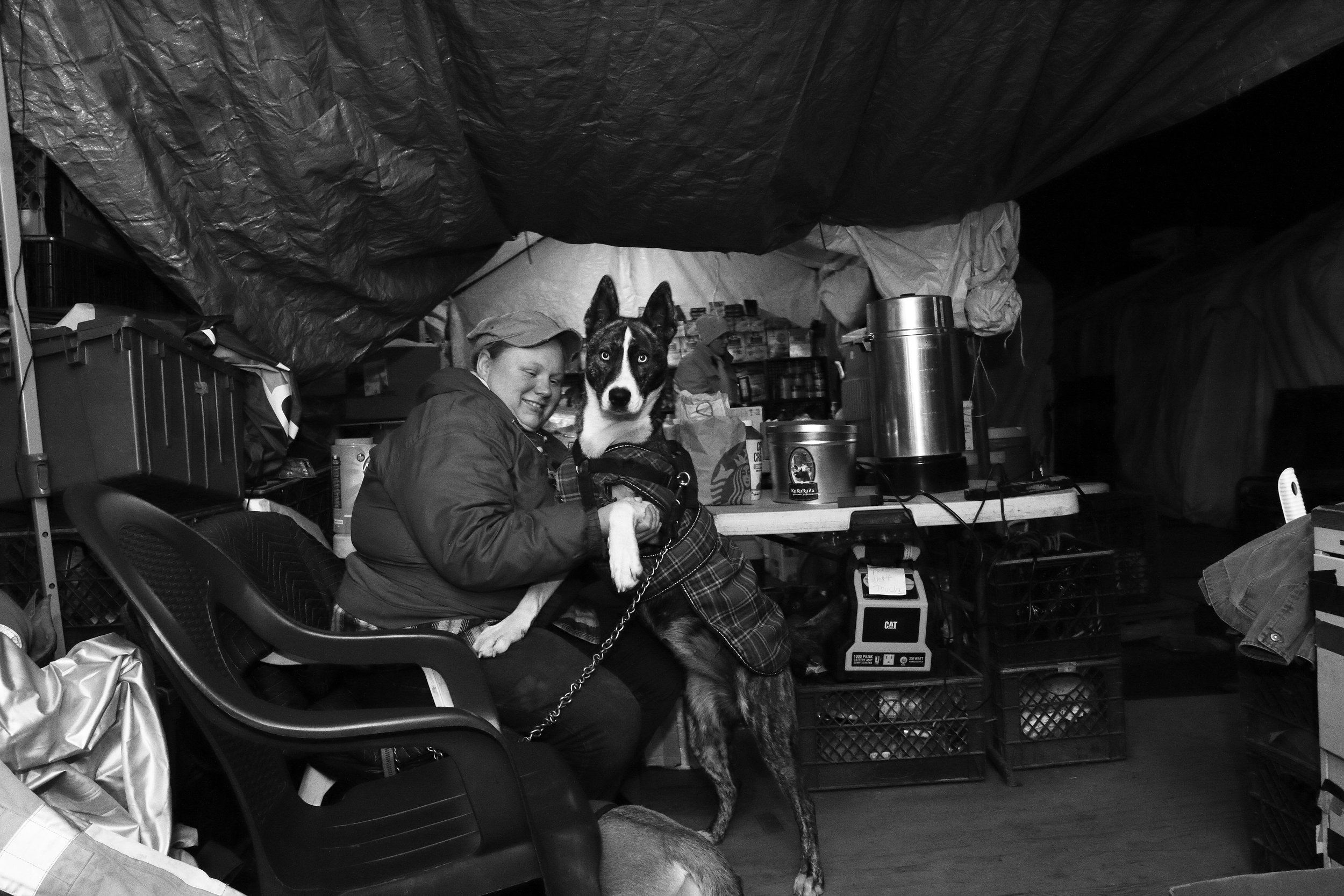
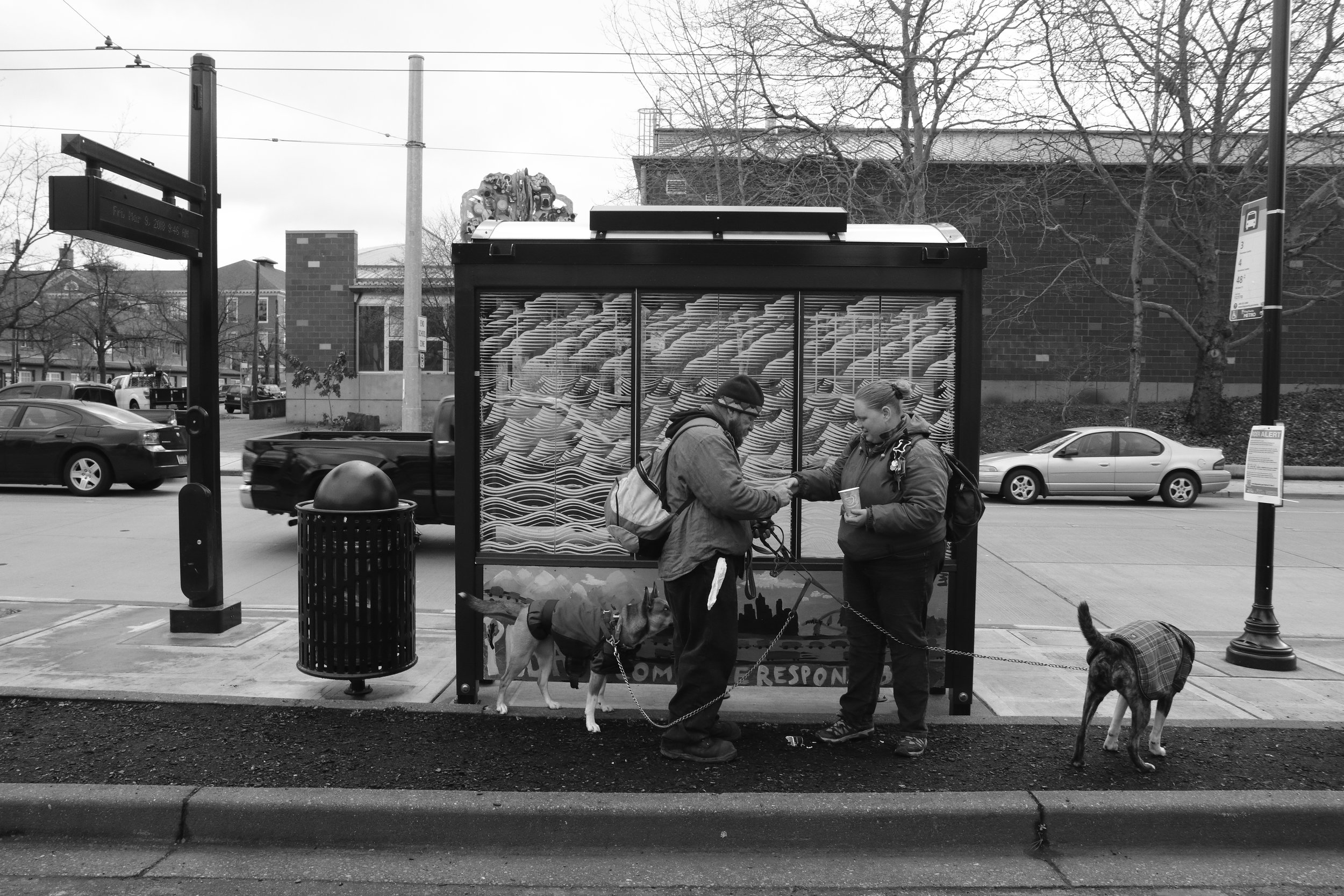
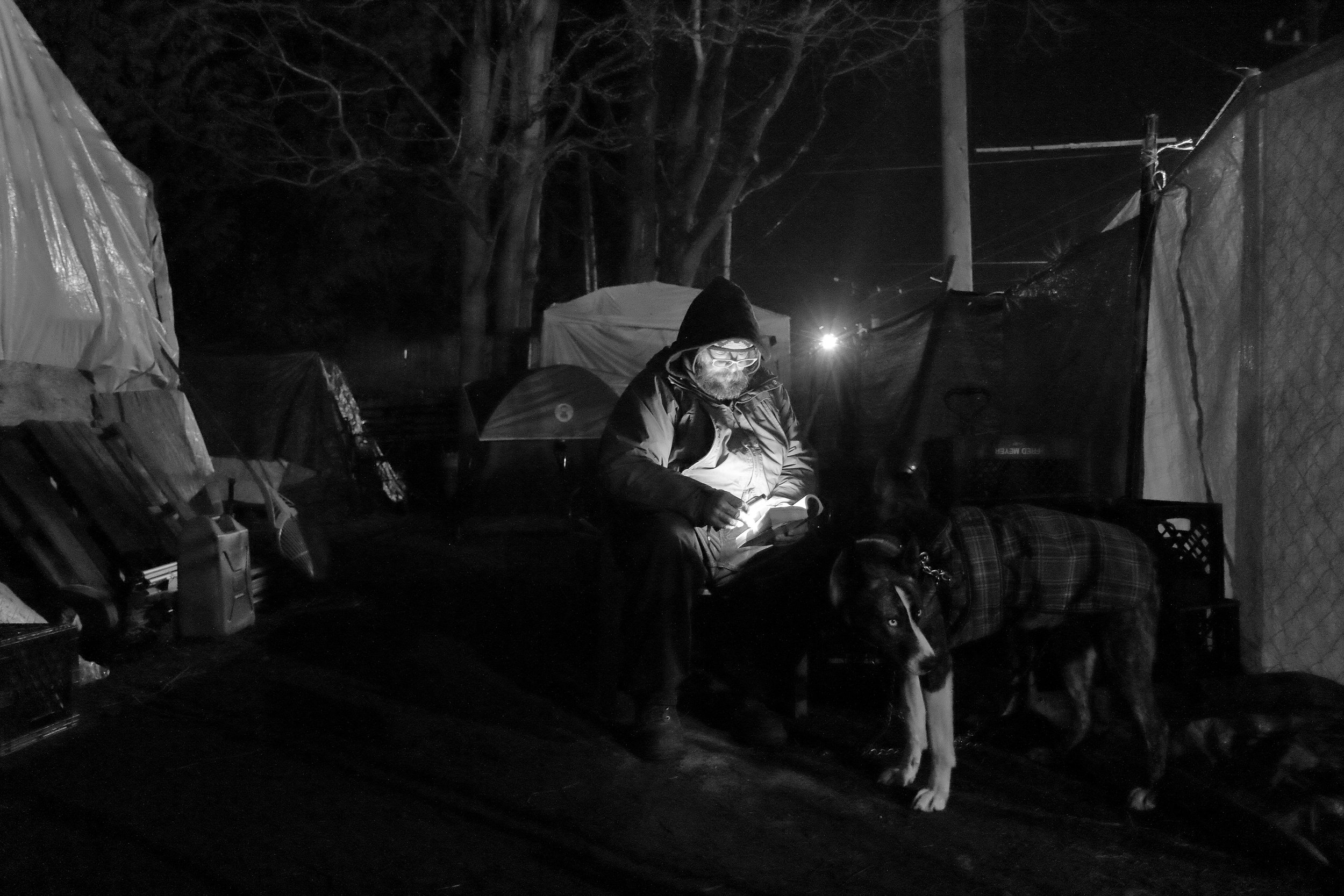
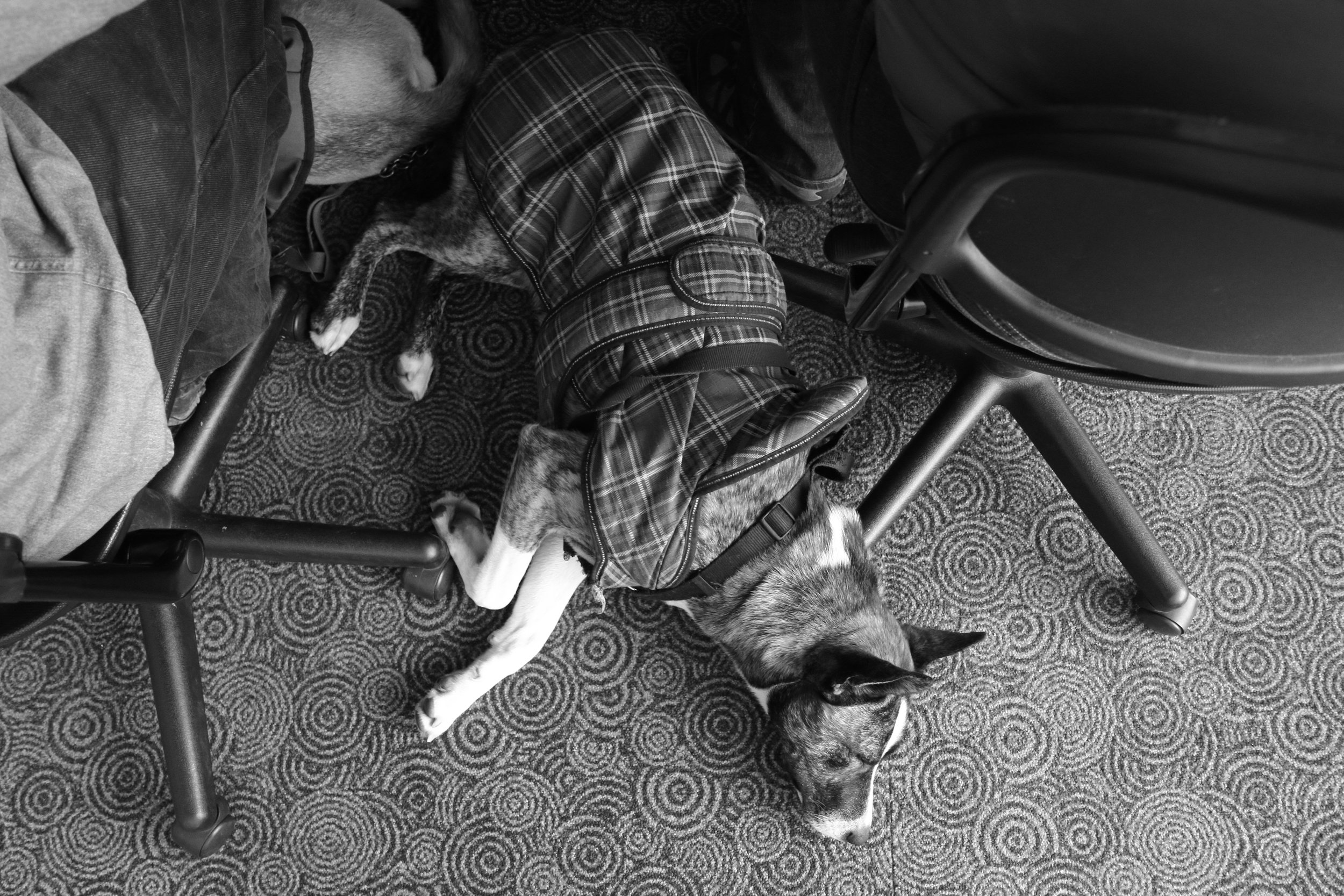
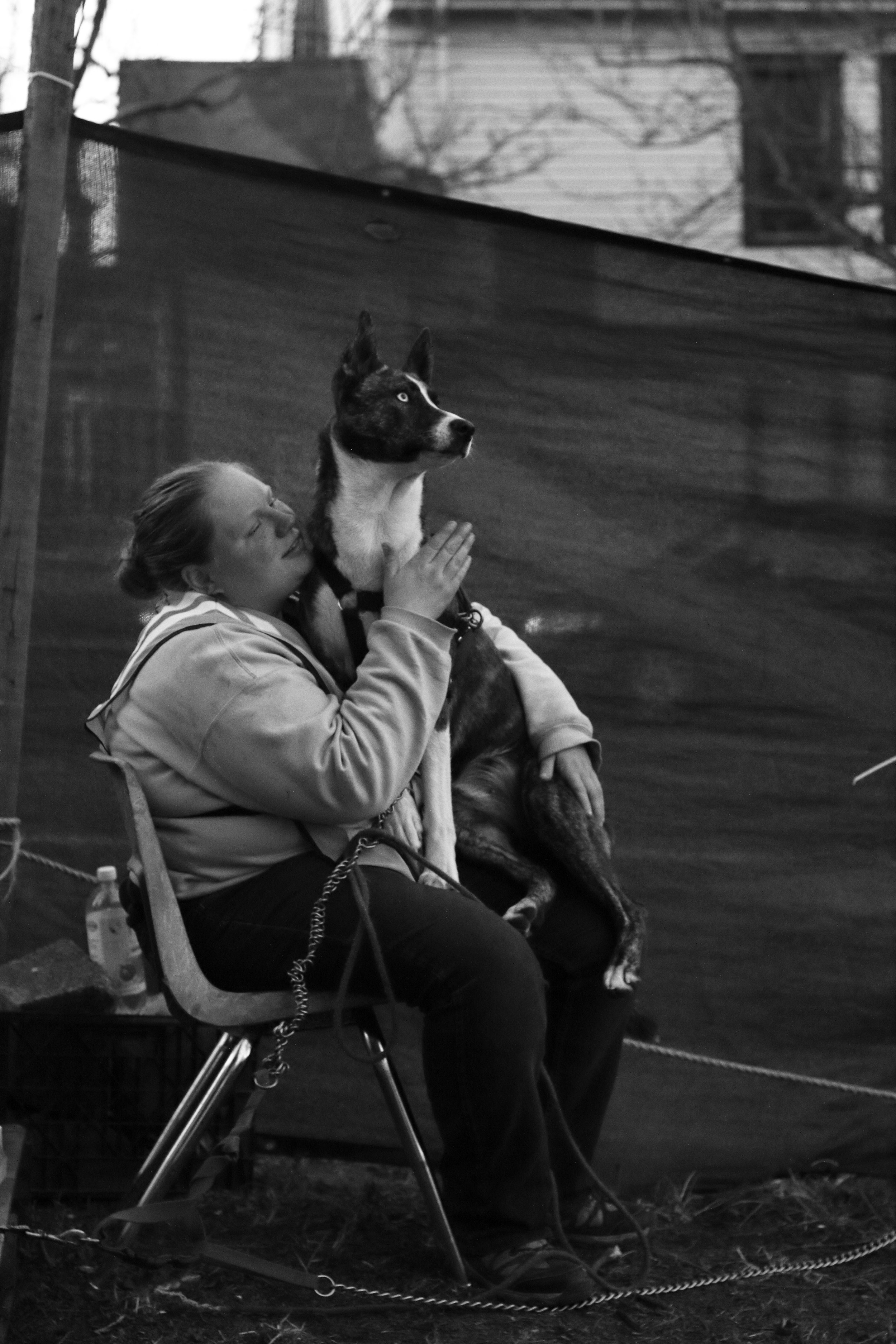
Redemption and recovery are strong themes in Ashley and Robert’s story of their two girls, Coral and Opal, who came into their lives in January of 2017. Coral and Opal are sisters, born in Tent City 5 in the tent next to Ashley and Robert’s and on their fourth anniversary. Ashley and Robert had been praying for an animal for four years, ever since they got married. When they got to meet the puppies, Coral and Opal were the first two to jump into Ashley’s arms. “Opal was trying to bite his beard off just as soon as [they met],” laughs Ashley. Today, it is clear these four are a close-knit unit. Almost in unison, the two describe their dogs as the “ultimate safety net.”
For Ashley, having the dogs has surpassed her expectations, “It was more of a surprise to me how much it helped. Cuz I got brainwashed by my parents saying that ‘Oh you gotta be on medication or we’re not gonna tolerate you’,” she says. Ashley was diagnosed with Asperger’s Syndrome and had been medicated for various struggles with mental health issues for years without seeing any real change for the better. “Throughout the years we’ve had suicide attempt and we’ve had great difficulties and some arrests and everything else for her outbursts and her emotional trauma. And this is somebody who’s on medication, this entire time. You gotta understand she’s day for day for her medication the entire time,” explains Robert. With the dogs in her life, things have taken a significant turn for Ashley in a way that nothing else ever has. Just six months after getting Coral and Opal, Ashley was able to get off all of her meds. Not only that, she hasn’t had an outburst since. “The only way we could ever work the meds off is with the dogs,” adds Robert, “The security, the safety net of the puppies, the constant caring, you get constant affection.” The dogs have helped her to communicate, too – “Yeah it’s got me talking. It’s really hard for me to communicate, in a sense. It seems like if I’m asked questions I just want to try to dodge the subject, but if it’s about the dogs [it’s easier]”.
The effect the dogs have had on Robert’s life is palpable, too. “He stopped drinking,” says Ashley, with a nod of the head and a laugh from Robert. “Without them he’d of been all over the place trying to look for a beer, while I on the other hand would have beat him senseless.” “Yeah, exactly, that’s exactly what would have happened,” Robert agrees. While he’ll still have a drink from time to time, it’s nothing like what it used to be, he says. The big difference for him is just having something else that occupies his time – “I don’t need to drink,” he explains, “[the dogs just give me] something else to do. Me and the dogs go everywhere, we do stuff. The dogs have two versions, it’s either go or sleep. You care for it and it cares for you. It is the buffer between all the situations that would get me in trouble. Your pet’s that one possession that you can’t replace. How am I taking care of myself if I’m homeless without someone or something there to keep me from going off the deep end?”
With such a strong impact on both of them individually, having the dogs helps Ashley and Robert support each other, as well. Robert takes care of the dogs if Ashley has an appointment she can’t or doesn’t want to take them with her to, and Ashely can watch the dogs on the rare occasion that Robert has a slip up with drinking. Without the dogs, they wouldn’t be independently functional enough to do things like that, Robert explains – “If I didn’t have them then Ashley would be in such a state that I wouldn’t want to leave her home alone and I wouldn’t be able to keep my head on straight long enough to work.” Now, the two of them haven’t been barred from a shelter or a Tent City since they’ve had the dogs, “There’s no more scenes, no more explosions, you know, I’m not doing the stupid stuff I was doing because we have the girls now and we’re always, you spend all day long taking care of your dog. I feel that a lot of your health is how you take care of your dog.”
“Your pet’s that one possession that you can’t replace. How am I taking care of myself if I’m homeless without someone or something there to keep me from going off the deep end?”
Ashley and Robert met while living in an SRO in San Francisco and are currently going on their sixth year of homelessness. Since they met, they’ve spent time in San Francisco twice, Seattle twice, and Fresno once. Life on the move has been difficult for them, but the dogs have helped with that, too. “Living this lifestyle is extremely – it’s always moving,” says Robert, “the situations are always changing. That’s what I think about the service animals, if you have a dog you have the one constant un-variable. You know, so it’s like I got this control and this control, and everything else is a variable. But this, this is a control because I’m always gonna be what I’m gonna be, and that dog is my control because it’s always gonna be what it’s gonna be, and the two of us are gonna be together.”
A normal day in the life of Ashley, Robert, and the dogs goes something like this, says Robert: “When they wake up, it’s hugs and kisses for the first 30 minutes, then it’s off to pee, morning poop – make sure that they get out the gate before they pee or they poop – check the poop, make sure it’s all healthy. Then it’s come back, we try to sit them outside by themselves within 10ft of the gate so they can get used to being right there but not being far and being good. Cuz they have separation anxiety but they have to be able to be 10ft away and not flip out. So that, we get our ducks together, then we usually stat traveling. And with them they probably get quite literally anywhere from two plus miles on foot with me and then they probably get anywhere from an hour plus play time with just them somewhere, like a field, a park, dog park.” Libraries, the Urban Rest Stop, and community centers are all destinations for Ashley, Robert, and the pups on their travels.
Ashley and Robert were quick to get Opal and Coral certified as service animals, deciding to register with an online company and well as approach Ashley’s doctor for a letter. “There was a big old bounce back,” Ashley explains, referring to the fact that there was some back and forth between two of her doctors to discuss Ashley’s request before she actually received the letter. It was important to her that she be able to get both dogs covered within the letter, too. When she got the letter, “It was the best thing that happened,” she says, “My particular medical doctor was actually greatly understanding of my medical condition. I told him I would like to have that letter to see if I can get my dogs turned into service animals and he said sure, that would be a great idea.” Robert says that, while the letters haven’t been particularly necessary for their life in Seattle, they know they’ll be needing them when the time comes for them to travel and to move back to California.
As for veterinary care, food, and items like harnesses, Robert feels like there are multiple options available to them in Seattle. Ashley and Robert had heard about the Doney Memorial Pet Clinic through their fellow Tent City residents that owned Opal and Coral’s parents and actually picked up their dogs at Doney, immediately getting their first shots taken care of. While others have struggled with Doney’s policy that animals be fixed after their first visit (with spay/neuter vouchers provided by the clinic), Ashley and Robert feel like they’ve been able to learn about alternate options while they choose to keep Opal and Coral intact for breeding down the road. “I feel that’s very just of them that they’re demanding that they offer this service they offer,” Robert explains, “they have the right to offer anybody anything and they feel like that. We just disagree with getting out girls fixed so we just seek anything else we need somewhere else. But it’s an awesome place, they do a super, super job.”
“I feel that a lot of your health is how you take care of your dog.”
Ashley and Robert take great pride in taking care of their dogs – “I’m not to trying to brag,” Robert says, “but people say our dogs are pretty taken care of. I think our dogs are pretty taken care of. I mean, look at their nails. The thing we pride ourselves most on is their nails. That’s how you can tell [they’re well taken care of].” They’re also well aware of how beautiful their girls are, with dozens of compliments being showered them on the daily. The result is not just prolific praise, though – Ashley and Robert believe that it makes a huge difference in how they are treated as people living unsheltered with their animals. “This is the funny part,” says Robert, “I think if they didn’t have blue eyes, I’d have a problem. Basically, you’ve seen, counting throughout the day, we will count 25-100 compliments throughout the day that they get. This is my running joke, that if we had two brown-eyed little ugly dogs we couldn’t do anything that these girls do – we still have to have paperwork everywhere we go but it shaves off the edge so much.”
Based on both his and Ashley’s experiences with Opal and Coral, Robert has become a fierce supporter for finding ways to get more animals into the arms of people experiencing homelessness. “I’m a strong advocate for people using animals over chemicals,” he explains, “because we have friends who’ve had service animals, everything from cat to squirrel, to god knows what, and I’ve never seen anybody that didn’t benefit from them.” To that extent, when it comes to selling Opal and Coral’s future puppies, they already have plans in place for how to make sure that can get into the hands of people who would really benefit from having a dog in their life. Some of these are more logistical, like price points and down payments, but some are based on a simple measure of feeling out how much they want it – “If they say the word “dog” at least than four times more than everything else then I know they want the dog,” explains Robert, “Cuz that’s what those people need – just that animal – and that’s what their whole life is gonna be about, is taking care of that animal. Because then they’re gonna spend their last two pennies on the better harness, the better tag, the better this, the better everything else. Cuz they won’t do nothing for themselves, as a lot of people in these environments do. It’s not ourselves we’re out to help, it’s our animals. So people put all their effort into their animals.”
Even with all the positive aspects of having dogs in their lives, Ashley and Robert do acknowledge that there are some complications that come with it, too, especially when it comes to maintaining good relationships with fellow Tent City residents. “It makes it more difficult because the dogs have to be cool dogs, they can’t be jerk dogs,” explains Robert, “they gotta mind their Ps, their Qs, not destroy stuff, you know bark irrationally and stuff like that. There’s some people that are tolerant off dogs but at the same time they’re gonna say later on, ‘Hey, you know, your dog is barking and it’s 1am and you gotta stop that animal.’” You won’t get thrown out, but you’ll get some difficulties. So that’s why we worked with the girls to be sociable. They’re usually really good dog park dogs and really good everywhere dogs. We say they’re service animals because, you know, it’s not a service dog if it’s being a jerk off – it’s gotta be able to go with you everywhere you gotta go, I mean we go everywhere with our dogs."
In the end, though, Ashley and Robert have ample experience showing them that the dogs have made their lives better. “And that’s why I kept saying we were praying for four years for a dog,” says Robert, “because I see how people are with service animals. People who have service animals are doing so much better – all smiles and stuff like that. They’re not complaining about the depression and the blue months and stuff like that. Cuz you don’t know how much homelessness sucks. I mean, life sucks, but homelessness sucks even more because it’s miserable, dank, dark, and dirty. But when you have two puppies, [it’s not] miserable, dank, dark, and dirty – it’s just two kissy faces who want to go out in the rain.”
